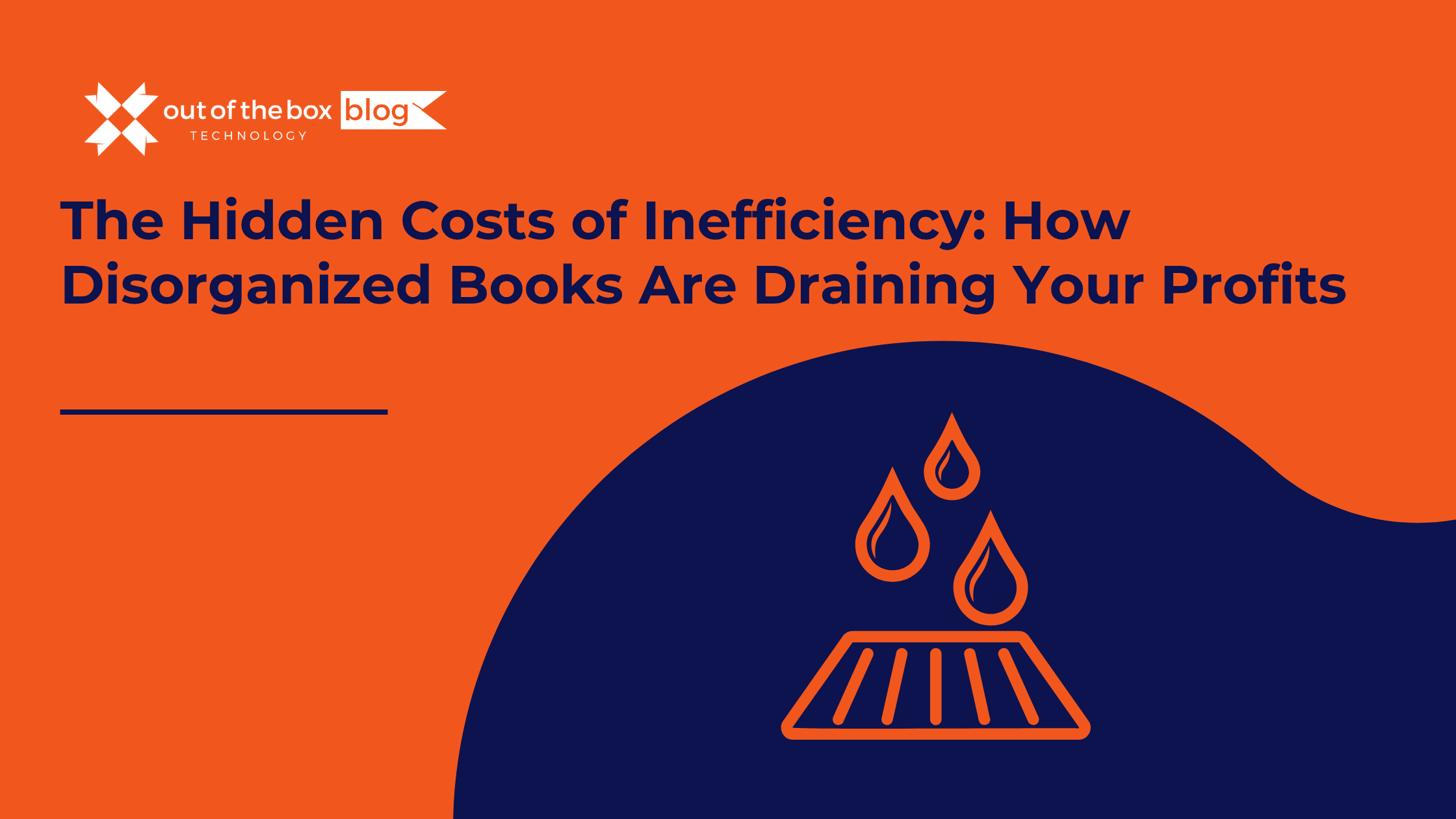You’re working harder than ever. Sales might be decent, and you feel busy. But somehow, the profits just aren’t where you expect them to be. You might be blaming market conditions, competition, or even just “bad luck.” But what if the real culprit is lurking right under your nose, in the form of disorganized and inefficient bookkeeping?
It’s easy to think of bookkeeping as a necessary evil, a back-office function that doesn’t directly impact your bottom line. But the truth is, disorganized books are like a silent leak in your financial pipeline, steadily draining your profits without you even realizing it. These inefficiencies manifest in numerous hidden ways, costing you time, money, and opportunities.
A study by the Small Business Administration (SBA) found that poor financial management is a contributing factor in over 50% of small business failures. While “poor financial management” is a broad term, at its heart often lies the issue of disorganized and inaccurate bookkeeping. If you don’t know where your money is going, how can you possibly control it?
This article will pull back the curtain on the insidious ways disorganized books are costing your business. We’ll explore the hidden costs, provide real-world examples, and, most importantly, show you how to plug those profit leaks and build a more efficient and profitable business with the help of streamlined bookkeeping practices and the right technology.
The Illusion of Control: Why “Getting By” Isn’t Enough
Many business owners operate with a level of bookkeeping that could be generously described as “getting by.” Receipts stuffed in shoeboxes, spreadsheets that haven’t been updated in weeks, and a general feeling of being overwhelmed when tax season rolls around. You might think you’re saving time or money by not prioritizing your books, but this short-sighted approach is almost certainly costing you more in the long run.
The illusion of control stems from a lack of clear visibility. Without accurate and timely financial data, you’re making decisions based on gut feeling rather than hard facts. This can lead to missed opportunities, overspending in unnecessary areas, and a failure to identify and address profit-eroding issues before they become critical.
Unmasking the Hidden Costs of Disorganized Books
Let’s delve into the specific ways inefficient bookkeeping can silently steal your profits:
1. Wasted Time and Increased Administrative Overhead
- The Cost: Your time, and the time of your staff, is valuable. Searching for misplaced invoices, trying to reconcile mismatched records, and manually entering data across multiple platforms are all time-consuming tasks that could be spent on revenue-generating activities.
- Example: Sarah, the owner of a small online retail store, handled her bookkeeping sporadically. When a customer disputed a chargeback, it took her hours to sift through old emails, payment records, and shipping confirmations to find the necessary information. This not only frustrated the customer but also pulled Sarah away from fulfilling new orders and developing marketing strategies.
- Data Point: Studies have shown that businesses with inefficient processes can spend up to 20% more time on administrative tasks compared to those with streamlined systems.
2. Missed Tax Deductions and Penalties
- The Cost: Tax season becomes a frantic scramble when your books are disorganized. You might miss eligible deductions simply because you can’t easily identify and document them. Furthermore, inaccuracies can lead to audits and costly penalties from tax authorities.
- Example: John, a freelance graphic designer, didn’t diligently track his business expenses. When tax time came, he estimated many deductions and likely missed several legitimate ones, such as home office expenses and software subscriptions. He also received a notice from the IRS due to inconsistencies in his reported income and expenses, leading to significant stress and potential penalties.
- Data Point: According to the IRS, common errors leading to penalties include inadequate record-keeping.
3. Poor Decision-Making Due to Inaccurate Data
- The Cost: Strategic decisions about pricing, hiring, inventory, and investments rely on accurate financial information. If your books are flawed, you’re essentially making these critical choices with incomplete or incorrect data, leading to potentially costly mistakes.
- Example: Maria, the owner of a restaurant, didn’t have a clear understanding of her food costs due to disorganized inventory tracking and sales data. She based her menu pricing on competitor analysis rather than her actual expenses. As a result, some of her most popular dishes were actually losing her money.
- Data Point: Businesses that regularly review accurate financial reports are significantly more likely to achieve their financial goals.
4. Difficulty Obtaining Financing and Investment
- The Cost: When you need a loan or want to attract investors, they will scrutinize your financial records. Disorganized or incomplete books raise red flags and signal a lack of financial control, making it difficult to secure the funding you need for growth.
- Example: Tom, the founder of a promising tech startup, approached several venture capital firms for funding. However, his haphazard bookkeeping and inability to provide clear financial projections deterred investors, who saw it as a sign of poor management and high risk.
- Data Point: Lenders and investors consistently cite clear and accurate financial statements as a crucial factor in their decision-making process.
5. Lost Opportunities for Cost Savings and Profit Improvement
- The Cost: Inefficient bookkeeping can mask areas where you’re overspending or where processes could be streamlined to improve profitability. Without clear insights into your expenses, these opportunities for savings go unnoticed.
- Example: Lisa, the owner of a marketing agency, wasn’t tracking her software subscriptions effectively. She realized only after a financial review prompted by a bookkeeping cleanup that she was paying for several unused or redundant software licenses, costing her hundreds of dollars each month.
- Data Point: Businesses that regularly analyze their expenses can often identify cost savings of 5-10% or more.
6. Increased Stress and Reduced Focus
- The Cost: Dealing with disorganized finances is stressful. It creates anxiety, takes up mental energy, and distracts you from focusing on the core activities that drive your business forward.
- Example: David, a solo consultant, constantly worried about whether he was invoicing correctly and if he had enough cash flow to cover his upcoming expenses. His disorganized system led to missed invoices and delayed payments, adding significant stress and preventing him from fully concentrating on client work.
7. Difficulty Measuring Performance and Tracking KPIs
- The Cost: Key Performance Indicators (KPIs) like profit margins, customer acquisition cost, and revenue per employee rely on accurate underlying financial data. Disorganized books make it difficult, if not impossible, to track these crucial metrics, hindering your ability to assess your business’s health and identify areas for improvement.
- Example: Emily, the owner of an e-commerce store, struggled to determine the profitability of her different product lines because her sales data wasn’t properly categorized in her bookkeeping system. This lack of insight prevented her from focusing on her most profitable products and optimizing her inventory.
Plugging the Profit Leaks: Strategies for Efficient Bookkeeping
The good news is that these hidden costs are avoidable. By implementing efficient and organized bookkeeping practices, you can plug those profit leaks and gain greater control over your financial destiny. Here are some key strategies:
- Embrace Cloud-Based Accounting Software: Platforms like QuickBooks Online automate many bookkeeping tasks, streamline workflows, and provide real-time visibility into your finances.
- Establish a Consistent Bookkeeping Schedule: Don’t wait until the last minute. Dedicate regular time (daily or weekly) to recording transactions, reconciling accounts, and reviewing your financial reports.
- Separate Business and Personal Finances: Commingle funds make bookkeeping a nightmare. Open a dedicated business bank account and credit card.
- Automate Where Possible: Utilize features like bank feeds, recurring invoices, and automated payment reminders to save time and reduce errors.
- Implement a System for Document Management: Digitize your receipts and invoices and establish a clear filing system (within your accounting software or a cloud storage service).
- Regularly Reconcile Your Accounts: Ensure that your bank and credit card statements match your accounting records to identify and correct any discrepancies.
- Understand Your Chart of Accounts: A well-structured chart of accounts is essential for generating meaningful financial reports.
- Don’t Be Afraid to Seek Professional Help: If you’re feeling overwhelmed or lack the expertise, consider hiring a bookkeeper or accounting firm like Out of the Box Technology. This can be a valuable investment that pays for itself through increased efficiency and accuracy.
The Power of Proactive Bookkeeping: An Example of Transformation
Consider the story of Green Thumb Landscaping, a small business that initially struggled with disorganized bookkeeping. The owner, Mark, handled everything himself in his spare time, leading to numerous errors and missed opportunities. He wasn’t sure which services were most profitable, often missed invoicing clients promptly, and dreaded tax season.
After partnering with Out of the Box Technology, Green Thumb Landscaping underwent a significant transformation. Their bookkeeping was streamlined using QuickBooks Online, automated invoicing was set up, and Mark received regular financial reports.
The results were dramatic:
- Time Savings: Mark freed up several hours each week that he could now dedicate to growing his business and serving clients.
- Improved Cash Flow: Automated invoicing and regular follow-ups reduced their average accounts receivable days by 25%.
- Identified Profit Centers: Clear financial reports revealed that their lawn maintenance services were significantly more profitable than landscaping design, allowing Mark to focus his marketing efforts accordingly.
- Reduced Tax Burden: Accurate expense tracking ensured they claimed all eligible deductions, reducing their tax liability.
- Increased Confidence: With a clear understanding of his financial position, Mark felt more confident in making strategic decisions and investing in new equipment.
Green Thumb Landscaping’s experience demonstrates the tangible benefits of moving from disorganized to proactive bookkeeping. It’s not just about compliance; it’s about gaining the financial intelligence you need to thrive.
Conclusion: Stop the Drain, Start Profiting
Disorganized books are more than just a minor inconvenience; they are a significant drain on your business’s profitability. The hidden costs of wasted time, missed opportunities, poor decision-making, and increased stress can collectively take a significant bite out of your bottom line.
By prioritizing efficient and accurate bookkeeping practices, you can eliminate these silent profit leaks, gain valuable insights into your business’s performance, and build a stronger financial foundation for sustainable growth. It’s time to stop “getting by” and start leveraging the power of organized financials to unlock your business’s true profit potential.
Take the Next Step Toward Financial Clarity
Ready to stop the profit drain and gain control over your business finances? Out of the Box Technology specializes in providing streamlined and efficient bookkeeping solutions tailored to your specific needs. Our expert team can help you clean up your books, implement efficient workflows using QuickBooks Online, and provide you with the clear, actionable financial reports you need to make informed decisions and drive profitability.
Don’t let disorganized books continue to hold your business back. Schedule a free consultation with one of our bookkeeping specialists today and discover how we can help you unlock your hidden profits.
In Conclusion
Disorganized bookkeeping isn’t just inconvenient—it quietly erodes your profitability. By neglecting accurate records, you risk:
-
Mismanaged expenses and missed tax deductions
-
Cash flow surprises and late fees
-
Misleading financial insights that derail growth
At Out of the Box Technology, we help you restore clarity, reduce mistakes, and leverage your data to drive smarter decisions and steady cash flow.
Ready to eliminate the hidden costs of messy books?
Book a Free Accounts Review Today and see how streamlined bookkeeping can elevate your financial confidence and free up time to grow your business.




